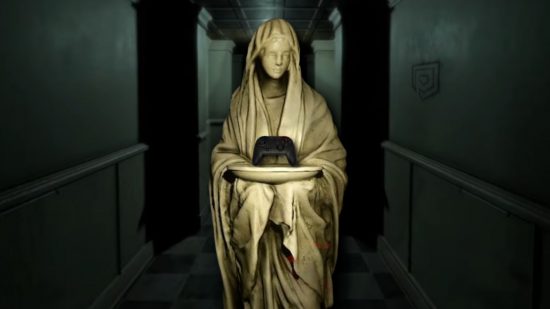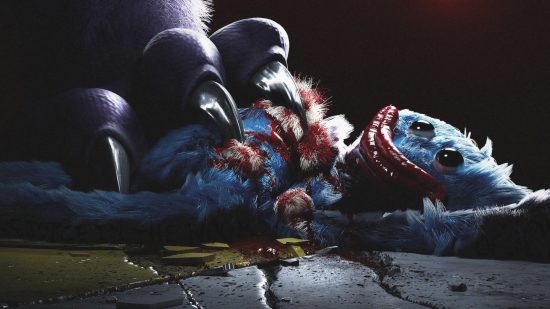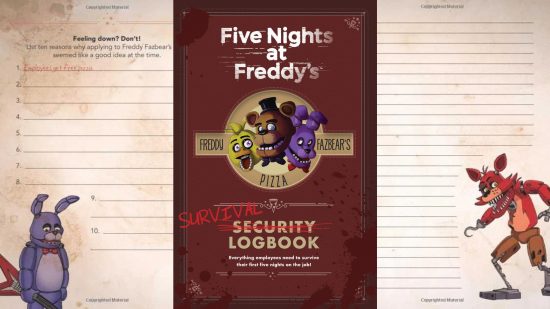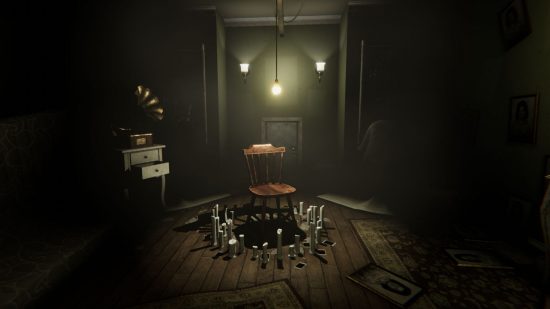We’ve seen plenty of great horror games over the years, and 2023 has been no exception. With Resident Evil 4 remake taking a top spot on many of our GOTY lists, Dead by Daylight still going strong, and big titles like The Texas Chain Saw Massacre elbowing their way onto the scene, triple-A horror is still going strong – though perhaps at a slower pace than other genres. So, why is it that indie horror games seem to have something that big-budget horror doesn’t?
In fact, if you cast your mind back over the biggest horror games in the last ten years, I’m going to bet that a lot of the titles that spring to mind had very humble beginnings. The menacing monsters that make up the cast of Poppy Playtime characters, the haunting horrors of the FNAF games, the deep and disturbing themes in Doki Doki Literature Club, the Lovecraftian horrors of Dredge, the many unanswered questions that keep us hoping for an Amanda the Adventurer 2 – even some of the best Roblox horror games like Roblox Doors. They all started as small indie projects and grew to become some of the most well-known names in this century’s horror world.
So, if you’ll excuse the Pennywise pun, what is the ‘IT’ factor that makes all these indie games so good? How can a .png of a creepy animatronic bear appearing over a grainy, static screen lead to one of the biggest horror franchises in the world? Why do we see Poppy Playtime’s Huggy Wuggy plushies in the arms of children everywhere? What makes mechanically simple games like Madison, Phasmophobia, and The Mortuary Assistant so much more engaging than a huge release with a familiar IP?
While I don’t have the answers to all these questions, I do have some theories. And, ironically, one of my theories is about theories. One thing that most of these iconic horror games have in common is that they generate a lot of online conversations, theories, and general discourse. I’ve already discussed this topic in both my beginner’s guide to ARGs and my Amanda the Adventurer ‘review’, but I feel it has a significant impact on indie games as a whole – especially horror.
We humans are naturally curious creatures, and we generally like to be able to tie things up with a nice, neat bow. There have been plenty of studies suggesting that we all display an innate desire for closure. If we find ourselves with a question about a plot point or a scrap of lore in a book, movie, or game, we expect to eventually get an answer. Then we can get on with our lives without that nagging sense of curiosity itching at our brains and keeping us guessing.
I think this is where a lot of big-budget horror goes wrong, both in movies and games. They often give us those answers a little too freely because they think that’s what we want. But that’s not strictly true. We don’t always want exposition dumps where the main character goes to a library or finds a diary that explains absolutely everything. We don’t always want the bad guy to monologue at us and tell us why they’re so evil. Sometimes, our own theories and conclusions are far more effective than those squeezed in by the creators, and indie horror game devs seem to have caught onto this.
You see, while we do want closure to some degree, sometimes external sources of closure can be disappointing. Have you ever watched a movie and guessed what was going to happen, then found yourself disappointed that you guessed it right? Or perhaps had a theory of what was going to happen at the end of a TV series, but the conclusion didn’t live up to your expectations? It’s kind of like that.
In my opinion, horror is about tension and unpredictability – preying on natural fears like the feeling of being watched, the unknown, or the monster hiding in the shadows, and using this to wiggle its way into your mind long after the experience is over. I believe that horror is most effective when it leaves mysteries open or messes with your expectations, be it through offering small scraps of lore with no conclusive answers, never revealing the true intent or origin of the monster, or hiding messages in the game or the code.
This then leads you to wonder what happened, pushing you to fill the gaps with your own imagination. You play the game again, checking for anything you missed. You go to forums to read what other people think and share your own opinions. You look at the dev or publisher’s websites and social media, comb through trailers, or, in the case of FNAF, go out and buy books to uncover more clues.
You might also go and watch content creators on YouTube, Twitch, and other platforms to see them play the game, as they follow the same steps and come up with their own conclusions. Their opinions and theories may make your opinions and theories shift, and you might go back through again with a fresh perspective. Or perhaps you disagree with the content creator’s conclusions and comment with your own theories, further driving interaction and keeping the discourse going.
Of course, one of the first channels that comes to mind when discussing this theory ecosystem is the Game Theorists. Their whopping subscriber count of nearly 18 million people attests to just how effective ‘theory baiting’ is in video games. It’s also one of the reasons why massive content creators like Markiplier and Jacksepticeye see so much success with horror game let’s plays and streams. I’ve recently been working through Hollow’s Chilla’s Art streams for the same reason – I’m familiar with all the games, but I enjoy seeing whether his opinions and the discussions in the comments align with my own.
If an indie dev has a great idea and strong concept, the game mechanics and budget can really take a backseat to the narrative – again, just look at how basic and rudimentary the early FNAF games are. While flashy graphics, a heap of exciting weapons and combat sequences, fully voiced cutscenes, and all the other trappings of top-notch triple-A games are certainly appealing in their own right, indie devs can rarely rely on that. Instead, they have to get creative with the materials they’ve got to make their game stand out in a sea of much shinier games.
And now it seems that the cultural zeitgeist has shifted to some degree. There are so many technically impressive games, with new ones dropping all the time – usually from publishers and studios that have a hefty pile of controversies under their belts – but many of them have failed, and so few have drummed up that same sense of fear I felt when playing Outlast, Silent Hill, or even the criminally underrated (and very early 2000’s) Obscure games for the first time. Instead, the pull of a real mystery that stretches beyond the game is looking much more appealing for many of us, offering a new layer of interactivity that stretches our imaginations and pushes us to get involved on an entirely different level.

On the other side of the coin, there has been some discourse over whether theories can have a negative impact on games, especially those still in development, and I understand where this is coming from. In fact, the Game Theorists even released a video about this. To summarize, as I hinted at earlier, a popular theory may be completely different from what the devs had originally intended to do, and that may influence their decisions and change the course of the narrative, damaging the integrity of the story. Alternatively, if many people work out all the ‘surprises’ a dev has planned for a game, they may feel pressured to change course to keep the mystery going, which can sometimes end up with a sub-par, rushed, or less satisfying conclusion.
However, there are also the positives. Feedback, theories, and just about any type of interaction generally stem from a sense of passion and interest in the project, offering not only fresh ideas, but also support and signal boosting for the game. In fact, if it weren’t for all of the conversations buzzing around online, it’s very unlikely that we’d have the FNAF we know today.
Additionally, this type of discourse is a very successful form of marketing, drumming up interest and inviting a wider audience in to explore the story – promoting the projects in a way that many indie devs wouldn’t otherwise be able to afford. There are plenty of these little hidden indie horror gems that I wouldn’t have played if it weren’t for my interest in the theory and ARG world, and even more that I likely wouldn’t have even heard of.
So, what is it that indie horror games have that big budget, triple-A titles don’t? Well, there are a lot of things, but in my experience, it mostly comes down to two interlinked features – a strong narrative with an enticing mystery, and a community of passionate theorists who want to solve it. Because horror’s not just about realism, flashy graphics, and recognizable characters like Freddy Kreuger or Jason Vorhees.
Horror is about the impact it has beyond the film, book, or game. It’s about picking at your personal insecurities and fears. It’s about an idea that worms its way into your head and stays there until you can’t rest. It’s about catching a shadow out of the corner of your eye or being scared of turning out the light. And if the story and mystery at its core can’t do that to you, then no amount of budget can save it.
If you happen to be an indie horror dev and you come across this piece – please keep making what you’re making, and be sure that you’re proud of the story you put out, whether it aligns with theories or completely deviates. Because it’s thanks to you and your awesome writing that the horror genre is still going strong.
Anyway, that’s just my theory – my (indie horror) game theory. Thanks for reading. If you fancy another horror-themed deep dive, be sure to check out our PT History Lesson on Resident Evil 4, our deep dive into the Poppy Playtime Chapter 3 theories, or our guide to all FNAF characters. We’ve also got a list of the best portable gaming consoles and the best gaming phones so you can take your spooks on the go.



